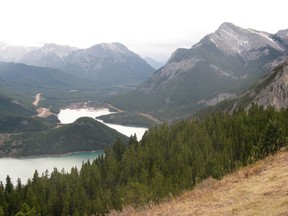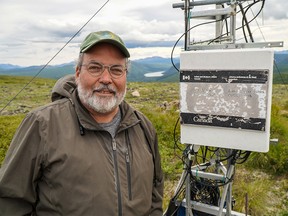‘It has been one other 12 months of drought. Now these wells are hitting all-time lows’

Article content material
In the midst of an Alberta mountain playground, adjoining to a well-liked ski resort, there’s a nicely sunk into the bedrock that has John Pomeroy fearful.
The Marmot Creek nicely in Kananaskis Nation has been there for generations, says the College of Saskatchewan water scientist. It’s one of many few groundwater monitoring wells that Alberta has within the mountains. Away from any human affect, it’s a great indicator of what’s really occurring.
Commercial 2
Article content material
Article content material
“The bottom water ranges are all within the final seven years and the degrees are a lot decrease now than they have been within the ’70s and ’80s,” Pomeroy mentioned.
“It’ll be a local weather sign that we’re seeing.”
As predicted by local weather change fashions, drought is desiccating the Prairies, particularly southern Alberta. The province has already warned municipalities to plan for an additional dry summer time, is making ready assist for farmers and goals to mobilize firefighting groups early.
However these measures handle floor water. About 600,000 Albertans rely on groundwater, and scientists and rural officers say not sufficient is understood concerning the results years of drought have had on the unseen flows beneath our ft.
“Now we have to ensure we’re managing groundwater and floor water as a standard useful resource,” mentioned Pomeroy. “If we deplete one, we’re depleting the opposite.”
Up to now, the alerts are blended. Alberta maintains a community of greater than 200 monitoring wells throughout the province and plenty of present water ranges which are secure and even growing.
However many should not.
Really helpful from Editorial
-

‘Let’s get forward of it’: Province hires Calgary-based firm to arrange drought modelling
-

Alberta’s drought might hinder Canadian beef business’s potential to additional scale back emissions
-

Setting minister warns municipalities to arrange for drought situations this 12 months
Article content material
Commercial 3
Article content material
Masaki Hayashi, a College of Calgary hydrologist, pointed to wells in Rocky View County exterior Calgary, dwelling to 40,000 individuals.
“It’s been one other 12 months of drought,” he mentioned. “Now these wells are hitting all-time lows.”
Lengthy-term developments are ambiguous, he mentioned. Precipitation cycles between moist years and dry.
However developments are leaning towards the latter. 4 dry years, 2015-18, have been adopted by a few moist ones. Precipitation information on the Calgary airport present the final three have been dry once more.
Creeks, rivers and lakes are all related and what seeps up should first soak down.
“Except you might have this recharge sometimes, (ranges) are going to maintain happening,” Hayashi mentioned.
‘A critically essential useful resource’
Paul McLauchlin, president of Rural Municipalities of Alberta and an environmental scientist, mentioned his members are more and more involved concerning the affect dry 12 months after dry 12 months is having on their water.
“It’s a critically essential useful resource that we have no idea a lot about,” McLauchlin mentioned.
“We’re in a 50-year drought, subsurface. Even when we get Snowmageddon, it’s not recharging the deficit that we’re going to see.”
Commercial 4
Article content material
Some wells in his space close to Ponoka have already dried up, he mentioned.
McLauchlin mentioned Alberta does a great job monitoring the state of groundwater, however falls down in the case of understanding the useful resource.
“Do we have now sufficient understanding of that floor join? Water might take 20 years to make it to floor from floor or it might take 1,000 years, relying on the world,” he mentioned.
“We simply don’t have the information to point out that.”
Alberta Setting spokesman Tom McMillan mentioned the province takes groundwater issues significantly.
“Because of drought situations, Alberta is growing groundwater monitoring to assist guarantee dependable entry to secure ingesting water in rural communities,” he mentioned in an e-mail. “We might be downloading elevated information this spring to raised observe water ranges and including close to real-time groundwater stage monitoring gear to extra wells all through the province.”
Properly house owners are inspired to observe water ranges, mentioned McMillan. The province is growing the variety of workshops out there to assist individuals with that work.
“In relation to water, we’re all in it collectively,” he mentioned.
Pomeroy is reluctant to generalize about what’s occurring to Alberta aquifers.

Some are at their lowest ranges ever, some are growing. The lag time between when the water falls and when it seeps into pore area within the rocks makes predictions tougher.
However developments are rising, he mentioned.
“In elements of Alberta the place there’s been drought for 4 or 5 years, we’re seeing groundwater ranges drop fairly considerably.
“It’s one thing we have to control.”
Article content material



